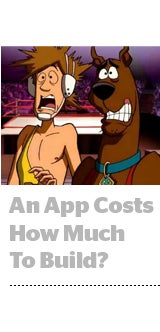Sometimes, a standalone app might be more trouble than it’s worth – especially if we’re talking about a branded game as part of a single activation.
For WWE Studios, a subsidiary of World Wrestling Entertainment that focuses on film development and production, that proved to be the case for “Road to Wrestlemania,” its first-ever mobile game.
First off, apps are expensive. A high-end game app costs between $150,000 and $200,000 for design and development. Then you actually have to get people to download the app and use it – ideally more than once.
If you’re Zynga, it makes sense to shell out the cash, both on development and on user acquisition. But for a brand, the expense and effort might not translate into ROI.
And without constant love, attention and a solid monetization strategy, an app is most likely destined to fall into the graveyard of unused apps on a user’s phone, where it’ll either be forgotten or, ultimately, deleted. Game over.
With “Road to Wrestlemania,” a free HTML5 game with a Scooby Doo tie-in, WWE Studios was looking to promote its new direct-to-video animated movie, “Scooby Doo! Wrestlemania Mystery,” which follows the action as cartoon versions of Michael Cena, Kane, Mr. McMahon and other WWE stars team up with Scooby and Shaggy to fight Ghost Bear, a big red hairy monster intent on derailing the main event at Wrestlemania. Players of the game are tasked with collecting clues and avoiding Ghost Bear as he tries to attack the Scooby gang’s Mystery Machine on the drive to Wrestlemania. (Play the game here.) A direct link to the Amazon store brings players to a page where they can buy a DVD of the movie or watch it via Amazon Prime.
Part of the challenge with the game was to reach the DVD’s teen target demographic in “an authentic way,” said Julie Tustin, former VP of marketing and publicity at WWE Studios.
“We knew they consume a large portion of their media on their mobile devices [and] we also knew that the type of content they like to consume most on these devices is gaming content,” Tustin said. “It was a natural fit for us to use a mobile web game as the means to promote the DVD.”
“Road to Wrestlemania” players launch the game in their mobile web browsers, which removes the download barrier to entry that exists for full-scale apps.
“The download requirement in the app store is a huge hurdle for a branded game,” said Rob Grossberg, whose company developed “Road to Wrestlemania” for WWE Studios. “People are just not very likely to download a branded game unless they are heavily incentivized to do so, and that costs money, so suddenly big marketing budgets are needed in addition to production costs for a native game.”
Incentivized traffic can also be of lower quality – and WWE Studios’ key performance indicators were related to engagement and DVD sales.
All told, “Road to Wrestlemania” has had more than 1 million game plays, and the “Scooby Doo! Wrestlemania Mystery” DVD sold out on Amazon, although the brand declined to share exact sales numbers. According to Tustin, the average play time was well over three minutes, a noteworthy number considering the target demo. Although TreSensa has seen certain mobile games garner up to five minutes of play, they often include some kind of additional social component, whereas Road to Wrestlemania had to abide by age-related restrictions, which prohibited the use of social elements or leaderboards.
And considering most mobile ads are about 15 seconds long, with the option to opt out after five seconds, people playing the Wrestlemania game were engaging with it roughly twelve times longer than they would view the average mobile video ad.
“Going with an HTML5 game was a great choice for us,” Tustin said. “We actually promoted the game on the expo floor of WrestleMania XXX’s Fan Axxess in New Orleans and got to see with our own eyes the excitement and engagement the game was able to produce with our fans. Because the game was content that they wanted and proactively chose to play, it was truly advertising without the advertising.”














